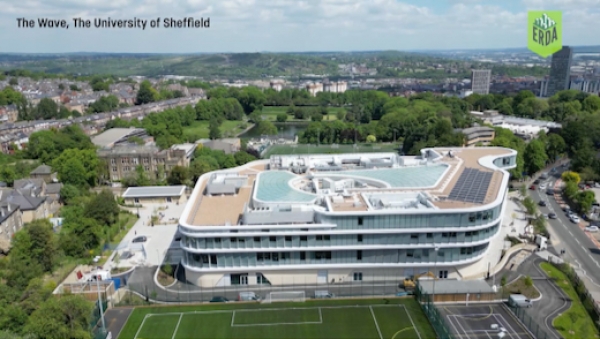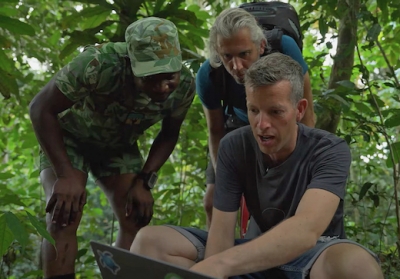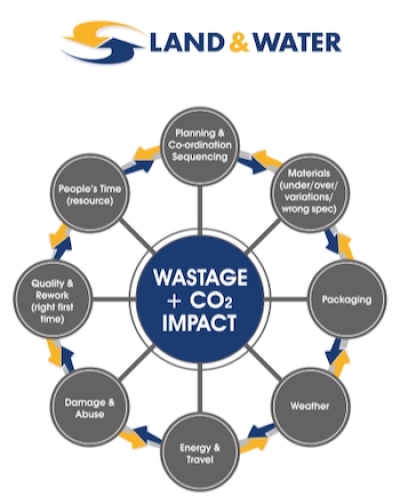Watch/Listen
With food waste costing £1,000 for an average household of four every year, Love Food Hate Waste has released a parody video with famous TV chef Gino D'Acampo this Food Waste Action Week to help shoppers save money by shopping for loose produce.
WRAP data reveals 60,000 tonnes of household food waste could be prevented every year if produce was sold loose and not packaged – the equivalent of over 8.2 million shopping baskets full, enough to fill 6,500 waste trucks.
UK households are encouraged to 'choose what you'll use' and embrace buying loose fruit and veg to help tackle food waste.
Watch the video below:
Erda Energy's geo-exchnge technology is delivering highly efficient low carbon heating and cooling to the Wave Building at the University of Sheffield.
Watch the video below:
Greenpeace has unveiled a star-studded cover of Fleetwood Mac's iconic single Don't Stop aiming to inspire a new generation of climate activists to move away from fossil fuels.
Created by Grammy-winning producer Fraser T Smith (Stormzy, Adele, Dave, Drake) and rapper Avelino, with a short film produced by Oscar-winning executive director Steve McQueen (12 Years A Slave), directed by McQueen's protege Samona Olanipekun of Lammas Park productions and featuring Will Poulter (Midsommar, Guardians of the Galaxy 3), Greenpeace claim the song is a reimagining of a classic for a new generation.
The film will air on the big screens at Glastonbury Festival's main stages throughout the weekend, with the project's branding used on-site, including Glasto's iconic tote bags reading: "Don't Stop Thinking About Tomorrow".
Watch the music film below:
The technology, which can detect different animal species and humans in real time, has the potential to discover numerous conflicts between people and wildlife, as well as illegal activities in protected areas, and provide live alerts to eco-guards.
Watch the video about using the AI technology to lessen the elephant-human conflict in Gabon below:
James Maclean, CEO of wet civil and environmental engineering firm Land & Water, is on a mission to drive down wastage in his construction and civil engineering industry from its current 30-38% levels.
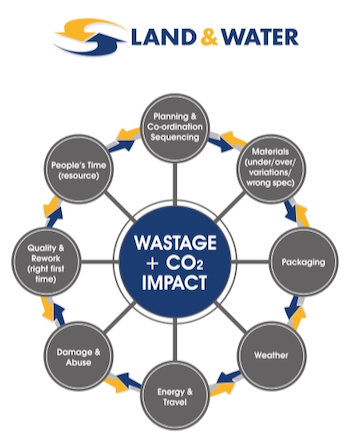 James has spent time looking at waste in the industry and says he is appalled at what he sees. His series of videos attempt to open a dialogue on the means to attack waste to drive down the industry's carbon footprint and race to net zero.
James has spent time looking at waste in the industry and says he is appalled at what he sees. His series of videos attempt to open a dialogue on the means to attack waste to drive down the industry's carbon footprint and race to net zero.
James explains: "We all have the ability - at every level and within every role - to respond to waste and it's time the industry took action in order to drive down our impacts and act with responsibility. Responsibility can be broken down into two words, response and ability and there are immediate changes we can all make."
Starting close to home by looking at its own company, Land & Water has identified eight key areas that can be tackled quickly by the sector in order to minimise time, energy and resources being wasted.
These eight areas are:
• Planning and co-ordination
• How materials and resources are used on site
• How the industry works with weather (and against it) to improve efficiency
• Energy, idle time and fuel
• Damage and abuse of equipment and working conditions
• Quality – by terms of getting it right the first time and avoiding re-work
• Our time - understanding our personal responsibilities to make sure we use our time as efficiently and effectively as possible.
Watch the intruduction video below:
Johnson Controls and Asset+ have delivered work with Hounslow Council in London that has resulted in a 50% reduction in carbon emissions and costs in schools and public buildings. One school even cut electricity bills by 64% and there was a £375,000 saving per year over the corporate estate.
Hounslow Council's 2017 data showed that 79% of the borough emissions came from gas. Schools across the borough alone were responsible for 67% of the Council's carbon footprint placing a question mark over the Council's ability to reach net-zero goals by 2030.
The partnership also brought benefits to the wider community. Teams saw a huge engagement and appetite from the schools, and during COP26, delivered a presentation to 3,000 pupils to discuss the climate and importance of green tech skills.
Watch the video below:
Students from a specialist learning college in St Helens have opened their own café and reuse shop to help the local community reduce, reuse and recycle more.
 The Not Too Shabby project is the vision of LEAP Specialist College in Newton-le-Willows, which has received £8000 from the Merseyside Recycling & Waste Authority and Veolia Community Fund 2022/23 to reduce household waste, increase recycling and encourage resource reuse.
The Not Too Shabby project is the vision of LEAP Specialist College in Newton-le-Willows, which has received £8000 from the Merseyside Recycling & Waste Authority and Veolia Community Fund 2022/23 to reduce household waste, increase recycling and encourage resource reuse.
LEAP (Lakeside Early Adulthood Provision) specialises in providing an autism learning environment for 19-to-25-year-olds. The environmental project has seen the students set up the café and shop at the Lyme and Wood Learning Hub on Vista Road in Newton-le-Willows which, as well as being a place for local people to enjoy, is a space for students to learn and develop news skills.
The café serves hot and cold drinks and snacks, all of which are catered by the LEAP students. Amongst a host of things, the shop sells reused and repurposed clothes, books, paint, art and general bric-a-brac.
 Teacher and project lead at LEAP Lauren Molyneux said: "The project is all about promoting more sustainable ways of living and for students to learn vocational skills in sectors like woodwork, horticulture, retail and hospitality.
Teacher and project lead at LEAP Lauren Molyneux said: "The project is all about promoting more sustainable ways of living and for students to learn vocational skills in sectors like woodwork, horticulture, retail and hospitality.
"The shop sells pre-loved items such clothing, footwear and products handcrafted from materials, for example reclaimed timber and textiles. It is also an official stockist of ReColour paint - a chalk paint made from recycled emulsion.
"Our furniture rescue scheme allows customers to select a piece of furniture to be upcycled using any of the colours from the ReColour range, as well as any other tweaks they wish to be made."
Chairperson of Merseyside Recycling & Waste Authority, Councillor Tony Concepcion, said: "This has been a great project as it has targeted a variety of materials which we know can be used again and not wasted. The Community Fund is great at reaching people we wouldn't normally be able to, raising awareness of waste issues, giving these students the knowledge and skills to help use Earth's resources sustainably."
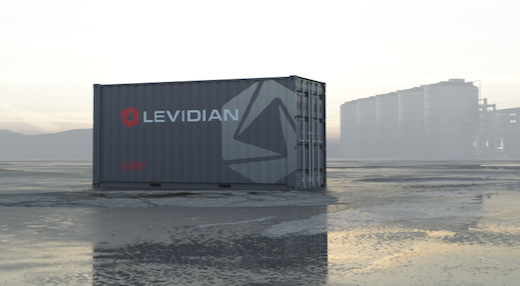 Decarbonisation technology will be deployed in the UK for the first time as part of a collaboration between climate tech company Levidian and solutions business Eco Group.
Decarbonisation technology will be deployed in the UK for the first time as part of a collaboration between climate tech company Levidian and solutions business Eco Group.
The LOOP device uses a patented low temperature, low pressure process to crack methane into its constituent atoms, hydrogen and carbon, without the need for catalysts or additives – decarbonising methane-rich gas to deliver hydrogen and graphene on site.
Following the initial deployment of the LOOP10 system at Eco's HQ at Annan, in Dumfries and Galloway, the firm has committed to working with clients and partners to deploy more than 60 larger LOOP1000 units across Scotland and beyond over the next five years. This will create decentralised hydrogen hubs to support industrial decarbonisation, enabling reduction of greenhouse gas emissions and creating products essential to net zero ambitions. A single LOOP1000 reduces CO2 equivalent (CO2e) by approximately 2,400 tonnes per year.
 The Cumbria Wildlife Trust have teamed up with with the Environment Agency to produce four films on the topic of 'Slow the Flow', showing how working with nature can help to reduce the impact of the effects of climate change for us and for wildlife.
The Cumbria Wildlife Trust have teamed up with with the Environment Agency to produce four films on the topic of 'Slow the Flow', showing how working with nature can help to reduce the impact of the effects of climate change for us and for wildlife.
The films use animated creature characters to reveal how various natural flood management techniques can decrease flooding downstream, reduce the impact of drought on land, and lessen pollutants in water.
The four short films focus on Farmland, Peatlands, Floodplains and Rivers as a natural solution to climate change.
Watch the first, Farmland - a natural solution to climate change, below:
 Richard Curtis, filmmaker and co-founder of sustainable finance campaign Make My Money Matter, and business guru Deborah Meaden of Dragon's Den fame convened in front of an audience to discuss how businesses are missing a trick when it comes to sustainability – their pension scheme.
Richard Curtis, filmmaker and co-founder of sustainable finance campaign Make My Money Matter, and business guru Deborah Meaden of Dragon's Den fame convened in front of an audience to discuss how businesses are missing a trick when it comes to sustainability – their pension scheme.
At London's The Conduit, the duo explored how our pensions are the most powerful tool at our disposal to tackle climate change – both as individuals and companies.
Across the world, businesses are ramping up their efforts to cut their carbon and become more sustainable corporate citizens.
But despite these efforts, they're failing to take advantage of this powerful tool at their disposal - their workplace pensions. That means the billions invested through them each year often remain misaligned with this vision, undoing all their good work.
The couple discussed the campaign's brand new research showing why pensions are any CEO's hidden superpower to change the world.
The presentation was made in collaboration with Make My Money Matter and the Financial Times.
Watch it below:


